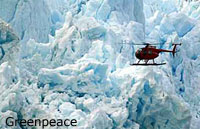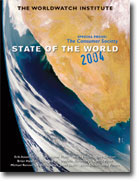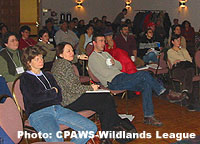
News |
- Patagonian Glaciers Melting
- Manitoba To Review Information & Privacy Laws
- Public Allowed Input in NAFTA Hearing
- Hydro on Aboriginal Lands - Public Forum
- Mackenzie Review - Test For Martin
- Enforce Migratory Bird Law - CNF
- Wuskwatim Panel Recognizes Metis Issues
- Heart of the Boreal Conservation Workshop
- CEC Dismisses Wuskwatim Motions
- Citigroup Takes Tough Environment Stand
- No Sanctuary in National Parks
- State of the World 2004 Released
Patagonian Glaciers Melting |
20 February 04 |
 New visual evidence of the impacts of climate change was released Greenpeace in Patagonia (Chile) on February 10, 2004. Dramatic new photos of Patagonian glaciers taken by the research team on board the Greenpeace vessel Arctic Sunrise show the extent to which climate change has caused the ice to melt this century, when compared to photos of the same glaciers taken in 1928.
New visual evidence of the impacts of climate change was released Greenpeace in Patagonia (Chile) on February 10, 2004. Dramatic new photos of Patagonian glaciers taken by the research team on board the Greenpeace vessel Arctic Sunrise show the extent to which climate change has caused the ice to melt this century, when compared to photos of the same glaciers taken in 1928.Greenpeace campaigner Joris Thijssen, said "rising temperatures are causing glaciers to melt all over the world. Here in Patagonia, they are disappearing at a rate of 42 cubic kilometres every year - faster than anywhere else on Earth. There are many reasons for the speed of the retreat and climate change is the trigger of this process." In recent years the melting of the glaciers in Patagonia has accelerated, which indicates human induced climate change. From 1995 through 2000 the rate of ice loss from the ice fields more than doubled. The sheer volume of melt water from glaciers is causing the sea levels to rise, increasing the risk of flooding in many of the world's coastal areas. It is also starting to cause problems for people who depend on the glaciers for their fresh water supply. This may cause enormous problems in the future given that a third of the world's population - 2 billion people, rely on rivers fed by Himalayan glaciers alone. A recent study by the journal Nature showed that climate change could drive a million of the world's species to extinction as soon as 2050. "Climate change is occurring because we use energy created by fossil fuels: oil, coal and gas. When these fuels are burned, they release carbon dioxide (CO2), a so called 'greenhouse gas' that causes the Earth to warm. "We all use energy in our daily lives and so we all have a part to play in solving this global crisis. Instead of relying on fossil fuels for our energy, we must make sure we are provided with clean energy from the sun, wind and small-scale hydro," concluded Thijssen. View the Greenpeace article and images online View the Greenpeace home page Source: Greenpeace |
|
Manitoba To Review Information & Privacy Laws |
20 February 04 |
 The Manitoba government is looking for public input on two laws-the Personal Health Information Act (PHIA) and the Freedom of Information and Protection of Privacy Act (FIPPA) - that protect personal information, including personal health information, and define rights of access to public sector and government records.
The Manitoba government is looking for public input on two laws-the Personal Health Information Act (PHIA) and the Freedom of Information and Protection of Privacy Act (FIPPA) - that protect personal information, including personal health information, and define rights of access to public sector and government records.Public hearings, co-chaired by Healthy Living Minister Jim Rondeau and Fort Garry MLA Kerri Irvin-Ross for Manitoba Culture Heritage and Tourism, will be held throughout the province this spring. Discussion papers for public review were released in the first week of February. FIPPA replaced the Freedom of Information Act in 1998. The act strengthened privacy provisions and extended the legislation beyond government records to include other public bodies such as municipalities and school divisions. "FIPPA balances the right to access information about government activities and the need to respect and protect personal privacy rights," said Culture Minister Robinson. "New technology offers governments and other organizations many opportunities to improve services. We need to hear how Manitobans feel about questions of access and privacy as technology presents us with both opportunities and challenges." The discussion documents are available online. Written submissions are encouraged until April 2. Public hearings will be held this spring in Winnipeg, Thompson and Brandon. Dates and times are to be announced. View the FIPPA Department contact information on this site. Source: Government of Manitoba |
|
Public Allowed Input in NAFTA Hearing |
20 February 04 |
 The International Institute for Sustainable Development (IISD), Winnipeg, Canada announced on February 3, 2004 that it has won a three-and-a-half year battle to take part in NAFTA hearings into claims that the state of California violated a British Columbia-based company's rights when it banned a polluting gasoline additive manufactured in Canada. The decision by a NAFTA tribunal to accept and formally consider public submissions in a major environmental case represents a precedent-setting "triumph for openness" in international trade and investment arbitration, says the Winnipeg-based organization.
The International Institute for Sustainable Development (IISD), Winnipeg, Canada announced on February 3, 2004 that it has won a three-and-a-half year battle to take part in NAFTA hearings into claims that the state of California violated a British Columbia-based company's rights when it banned a polluting gasoline additive manufactured in Canada. The decision by a NAFTA tribunal to accept and formally consider public submissions in a major environmental case represents a precedent-setting "triumph for openness" in international trade and investment arbitration, says the Winnipeg-based organization.The breakthrough was welcomed by the David Runnalls, President of IISD, as a new breach in the walls that have surrounded international trade and investment arbitration cases. "Foreign investment is critical to achieving sustainable development today. But foreign investor rights that take priority over the right of policy-makers to govern and legislate in the area of sustainable development are self-defeating" said Mr. Runnalls. IISD Senior International Lawyer, Howard Mann said the Institute's submission to the Tribunal for formal consideration will represent "a true landmark, firmly establishing another global precedent towards the democratization of international investment cases and international investment law." View the full IISD news release and backgrounder online Source: International Institute for Sustainable Development |
|
Hydro on Aboriginal Lands - Public Forum |
10 February 04 |
 "Old Relationships or New Partnerships? Hydro Development on Aboriginal Lands in Manitoba and Quebec," is the theme of a thought provoking, free public forum to be held at the University of Winnipeg, Monday, February 23rd.
"Old Relationships or New Partnerships? Hydro Development on Aboriginal Lands in Manitoba and Quebec," is the theme of a thought provoking, free public forum to be held at the University of Winnipeg, Monday, February 23rd."We are bringing this debate to the public with a diverse mix of featured speakers", said Don Sullivan of The Boreal Forest Network. "The Honourable Tim Sale, Minister responsible for Manitoba hydro development, Grand Chief Ted Moses of the Grand Council of Crees, Manitoba Metis Federation President David Chartrand, a panel of Elders from affected Manitoba First Nations, academics, environmentalists, and hydro officials are among the presenters who will be sharing their perspectives with the public. It's quite an opportunity." "Manitoba and Québec have a similar and long history of hydro-development", said University of Winnipeg Professor Thibault Martin. "Both provinces, also, postponed their hydro-projects in the 1990's, and resumed them in recent years in order to take advantage of the anticipated soaring demand for energy in the United States." "The goal of this conference is to debate these new projects and agreements and to explore the notions of "fair deal", "partnership" and "nation to nation relationship," said University of Manitoba, Professor Peter Kulchyski. "This is everyone's issue", added Sullivan. "We encourage you all to come out." Download the full release here: English or French Download the Speakers list here Download the PDF poster (388 KB) here Source: Boreal Forest Network |
|
Mackenzie Review - Test For Martin |
9 February 04 |
 The environmental assessment of the $5 billion proposed Mackenzie Valley pipeline is a litmus text for Paul Martin's commitment to the environment warn national environmental groups.
The environmental assessment of the $5 billion proposed Mackenzie Valley pipeline is a litmus text for Paul Martin's commitment to the environment warn national environmental groups."The 1200-km pipeline complex is Canada's biggest mega project since the aborted Great Whale hydroelectric development in the early 1990s" says Elizabeth May, executive director of Sierra Club of Canada. "Prime Minister Martin needs to reassure Canadians that the review of the project will be at least as good as Brian Mulroney and Robert Bourassa demanded for Great Whale." "This project is transforming the landscape of Canada's Arctic as we speak. DIAND has just announced it is seeking proposals to develop new oil and gas projects in the Mackenzie Valley and Delta and in the Beaufort Sea" said Karen Wristen, executive director of Canadian Arctic Resources Committee. "Northerners need to have every opportunity to participate in the environmental assessment process-but the environmental, social and economic impacts of the pipeline go far beyond the North" says Julie Gelfand, president of Canadian Nature Federation. A statement of principles for oil and gas development released by six northern NGOs on October 11, 2001 (including CARC) states: "Environmental assessment processes must be rigorous, examine the need for and alternatives to energy projects (including the 'no-go' option), provide for meaningful intervener funding, ensure a broad assessment of cumulative effects, implement the precautionary principle and full-cost accounting, and establish timelines that will encourage the full participation of northerners." The three national groups are concerned about various adverse environmental effects of the pipeline. To address some of these adverse effects, a system of protected areas that includes ecologically and culturally representative, large self-regulating ecosystems and key wildlife habitat areas must be identified and reserved for legal protection before the pipeline project is approved. View the full January 15, 2004 CNF Media Release Source: Canadian Nature Federation |
|
Enforce Migratory Bird Law - CNF |
9 February 04 |
 The Canadian Nature Federation is pleased with a recent recommendation by a NAFTA watchdog agency to investigate Canada's failure to protect migratory birds in Ontario's forests. The CNF is now looking to federal Environment Minister David Anderson to support the investigation.
The Canadian Nature Federation is pleased with a recent recommendation by a NAFTA watchdog agency to investigate Canada's failure to protect migratory birds in Ontario's forests. The CNF is now looking to federal Environment Minister David Anderson to support the investigation.In late December 2003, NAFTA's Commission for Environmental Cooperation (CEC) Secretariat recommended that the Canadian Government be investigated for allegedly failing to enforce the Migratory Birds Convention Act with respect to logging activities conducted in Ontario's forests during the summer of 2001. "The Migratory Birds Convention Act is an important and powerful tool to protect Canada's birds." noted Marc Johnson, Manager of Protection Campaigns for the Canadian Nature Federation. "But to be effective, the law must be properly enforced." The CEC was formed under a side agreement to NAFTA and acts as a watchdog to ensure that each of the member countries enforces its environmental laws. In February 2002, Sierra Legal Defence Fund submitted a complaint to the CEC on behalf of the Canadian Nature Federation and seven other Canadian and U.S. environmental organizations alleging that massive numbers of bird nests are being destroyed each year during clearcutting operations by logging companies, and requesting that an investigation be undertaken into this matter. "We are hopeful that the Canadian, U.S. and Mexican environment ministers will support the expert advice of the CEC Secretariat and allow this important investigation to proceed." added Mr. Johnson. View the Backgrounder online Source: Canadian Nature Federation |
|
Wuskwatim Panel Recognizes Metis Issues |
5 April 04 |
 Water Stewardship Minister Steve Ashton announced March 29, 2004 that the Manitoba government is launching a legal challenge in the form of an appeal against North Dakota's Devils Lake water diversion project.
Water Stewardship Minister Steve Ashton announced March 29, 2004 that the Manitoba government is launching a legal challenge in the form of an appeal against North Dakota's Devils Lake water diversion project.Devils Lake is a closed sub-basin lake that has been isolated from the Hudson Bay drainage basin for over 1,200 years. Manitoba opposes the outlet plan because it could release dissolved solids, sulphates and harmful nutrients (40 more tonnes of phosphorus per year) as well as foreign fish pathogens and fish diseases to the Sheyenne River. The Sheyenne connects to the Red River and eventually flows into Lake Winnipeg. "North Dakota is unilaterally and aggressively moving ahead with construction of the outlet in spite of recent concerns raised by the U.S. Department of State," said Ashton. "Manitoba has pursued diplomatic options to raise our concerns with the project but all of these have been ignored by North Dakota." Manitoba has been calling for the Government of Canada to pursue a joint reference with the United States to the International Joint Commission on the Devils Lake project. Opposition to the project has also been expressed by the Government of Canada, the states of Minnesota and Missouri, the National Wildlife Federation and the Peterson Coulee Outlet Association. In February 2004, several American First Nations agreed to joint action to oppose the Devils Lake outlet project. The Red Lake Nation, Spirit Lake Nation, White Earth Reservation and the Assembly of Manitoba Chiefs participated in a First Nations and the Tribal summit. View the March 29, 2004 Manitoba Government press release Source: Government of Manitoba |
|
CEC Dismisses Wuskwatim Motions |
6 February 04 |
 The Clean Environment Commission (CEC) panel for the review of the Manitoba Hydro/Nisichawayasikh Cree Nation (NCN) proposed Wuskwatim Generation and Transmission projects convened a Motions Hearing January 23, 2004. The hearing follows the initial Environmental Impact Statement submitted in April 2003, two Supplemental Filings, a round of Interrogatories directed at Manitoba Hydro/NCN, and requests for further disclosure of information resulting from responses to Interrogatories. The purpose of the hearing was to hear motions about the disclosure of information. The Clean Environment Commission (CEC) panel for the review of the Manitoba Hydro/Nisichawayasikh Cree Nation (NCN) proposed Wuskwatim Generation and Transmission projects convened a Motions Hearing January 23, 2004. The hearing follows the initial Environmental Impact Statement submitted in April 2003, two Supplemental Filings, a round of Interrogatories directed at Manitoba Hydro/NCN, and requests for further disclosure of information resulting from responses to Interrogatories. The purpose of the hearing was to hear motions about the disclosure of information. Five parties brought forward Motions before the CEC panel - the Displaced Residents of South Indian Lake (DRSIL), Trapline 18, the Consumers Association of Canada / Manitoba Society of Seniors (CAC/MSOS) which was withdrawn, Manitoba Wildlands-Canadian Nature Federation, and the Manitoba Metis Federation (MMF). Each party requested action to be taken by the CEC. The motion from Manitoba Wildlands-Canadian Nature Federation (CNF) requested that the CEC order the proponents to produce all documents and materials still outstanding. In the alternative, the motion asked the CEC to undertake the necessary review of all Interrogatories and filings to determine outstanding information and then require the proponents to provide this information. The CEC ignored the Manitoba Wildlands-CNF motion request that the CEC require information to be provided, and said "[t]he motion, as filed, did not specify the information sought and did not describe the relevancy of, or purpose for, the specific information requested." The CEC ruling indicates that "the examples contained in the CNF/MW motion will be carefully considered as part of this reiew" (climate change, protected areas, and access to reports and maps). Download the Manitoba Wildlands-CNF January 23, 2004 Motion (DOC) |
|
Citigroup Takes Tough Environment Stand |
6 February 04 |
 Citigroup,
the world's largest financial institution, announced January 22, 2004 that
it is adopting a corporate policy to carefully evaluate requests for project
financing that could adversely affect the environment. Citigroup,
the world's largest financial institution, announced January 22, 2004 that
it is adopting a corporate policy to carefully evaluate requests for project
financing that could adversely affect the environment.It also bans funding for illegal logging operations and commits Citigroup "to invest in sustainable forestry and renewable energy." The initiatives come after four years of anti-Citi demonstrations by the Rainforest Action Network, a group whose latest campaign targets Ford Motor for lobbying against higher fuel-efficiency standards for vehicles. View the full MSNBC January 22, 2004 article online View Citigroup's new policy online Sources: The Associated Press, MSNBC.com |
|
No Sanctuary in National Parks |
3 February 04 |
 There likely won't be any polar bears left breeding in Wapusk National Park in Manitoba within the lifetimes of many Canadians. Wapusk was established in 1996 on the shores of Hudson's Bay specifically to protect the home of the world's largest denning and gathering place for polar bears. There likely won't be any polar bears left breeding in Wapusk National Park in Manitoba within the lifetimes of many Canadians. Wapusk was established in 1996 on the shores of Hudson's Bay specifically to protect the home of the world's largest denning and gathering place for polar bears. A similar fate awaits muskoxen, spotted turtles, lemmings, Peary caribou and scores of other animal species now sheltered within national parks. Canada's 41 national parks are supposed to "protect for all time" certain types of ecosystems. A new threat to park conservation arises not from the usual suspects - the crush of visitors, pollution and encroaching development - but from climate change, a force far more relentless and difficult to combat. It looks like Parks Canada officials are largely satisfied to simply study the problem and gloss over the implications of climate change. The mostly gloomy findings of a 200-page first look into the tremendous impact that climate change will have on the country's national parks were reported to Parks Canada in 2000. "Climate change has the potential to undermine decades of notable conservation efforts in Canada and poses a potential threat to this intergenerational heritage trust," the report concluded. The study's leading recommendation was for a "comprehensive reassessment of Canada's national parks system in the context of climate change." Parks Canada officials say no such reassessment has started. View the January 24, 2004 Toronto Star article Source: Toronto Star |
|
State of the World 2004 Released |
3 February 04 |
 A Bangladeshi child eats a bowl of rice. An American child plays with a plastic doll. A woman in Finland talks on a cell phone. A man in Zimbabwe fills his car with gasoline. A Japanese woman reads a newspaper. A Bangladeshi child eats a bowl of rice. An American child plays with a plastic doll. A woman in Finland talks on a cell phone. A man in Zimbabwe fills his car with gasoline. A Japanese woman reads a newspaper.Think of the objects you buy and use in any given day. Now, try to imagine that there are more than 1.7 billion human beings in the consumer society and their numbers are growing yearly. Meanwhile, there are still another 2.8 billion who consume too little and who suffer from hunger, homelessness, and poverty. On the Worldwatch Institute's thirtieth anniversary, the special edition of State of the World 2004 examines how we consume, why we consume, and what impact our consumption choices have on the planet and our fellow human beings. Businesses, governments, and concerned citizens can harness this same purchasing power to build markets for less-hazardous products. With chapters on food, water, energy, the politics of consumption, and redefining the good life, Worldwatch's award-winning research team asks whether a less-consumptive society is possible and then argues that it is essential. View the Worldwatch January 5, 2004 press release Source: World Watch |
|


 RSS Feeds:
RSS Feeds: Fifteen First Nations met with nine conservation groups and others on January 28 and 29, 2004 in Thunder Bay, Ontario to talk about how they could work together to care for the northern boreal forest in Ontario and Manitoba.
Fifteen First Nations met with nine conservation groups and others on January 28 and 29, 2004 in Thunder Bay, Ontario to talk about how they could work together to care for the northern boreal forest in Ontario and Manitoba.